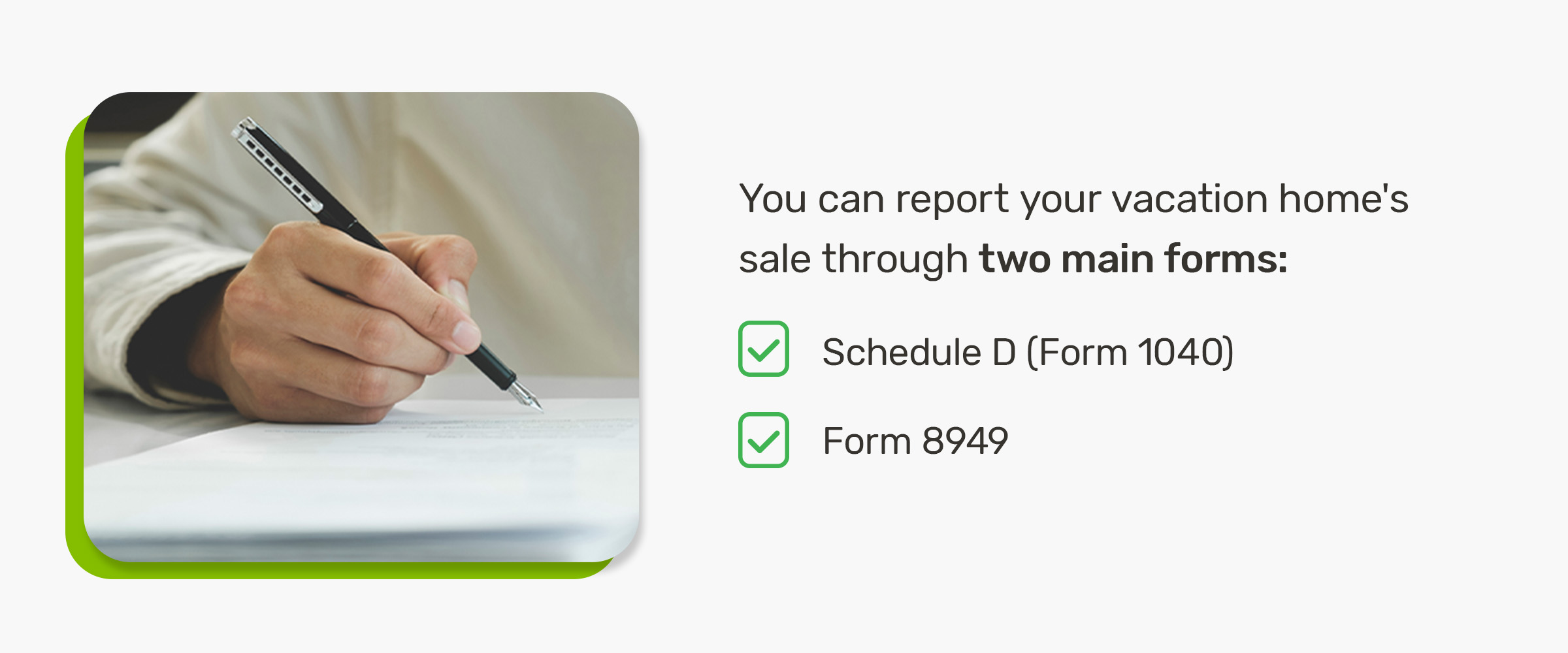When selling any property aside from your primary residence, you may be responsible for other types of taxes. The tax implications of selling a vacation home often vary depending on your situation. This guide explores the taxes you might need to pay when selling your vacation home, depending on how you used it. We’ll also learn how to report this sale to the IRS and ways you might be able to reduce taxes on your second home.
What Taxes Do You Pay When Selling a Vacation Home?
A vacation home may be an appreciating asset if its value increases over time and the owner plans to sell it at some point. When owners choose to sell their vacation homes, they may need to pay capital gains tax. Capital gains tax is what taxpayers owe when they sell an appreciating asset and make a profit. There are two primary categories of capital gains tax when selling a non-primary residence:
- Short-term capital gains tax: You might pay short-term capital gains tax when you sell a non-primary residence you’ve owned for a year or less. This tax usually has the same rate as your ordinary income.
- Long-term capital gains tax: You’ll need to pay long-term capital gains tax if you’ve owned your vacation home for over a year. This tax rate can usually range between 0% and 20%, depending on your income level.
How Does Selling a Vacation Home Affect Your Taxes?
The taxes you pay on the sale of your vacation home will vary based on how you used the property when you owned it. Here are three of the most prominent scenarios and how they may affect your taxes.
Scenario 1: You Only Used the Home Occasionally
In this scenario, you have not used the vacation home as your primary residence or rented the property to anyone. As such, the profit you gain from selling your vacation home will be taxed, and a principal residence gain exclusion break will be unavailable.
If you owned the property for over a year, you’ll owe one of the long-term capital gains tax rates. You may also owe state income tax and net investment income tax (NIIT). NIIT is mainly relevant if your modified adjusted gross income (MAGI) is over a specified amount or if you have investment income.
Scenario 2: You Rented out the Vacation Home
Have you rented out your vacation home and deducted depreciation for these periods? In that case, you may be subject to a certain percentage of the federal income tax rate on the gain amount attributable to the depreciation. This is known as the unrecaptured Section 1250 gain, which is a tax provision that recaptures the portion of a gain related to previously used depreciation allowances. For this reason, your taxes may include the cumulative depreciation deduction amount you claimed for the property over the years.
Furthermore, if you’ve rented out the property but it is classified as a personal residence because it has been used more for personal purposes, you may be able to deduct disallowed losses in the year that the property is sold only to the extent of the taxable gain.
Your vacation home may be classified as a rental property if you’ve used it for more rental purposes than personal purposes. In this case, you may be able to deduct suspended passive activity losses (PALs) when selling the property.
Scenario 3: You Used the Home as Your Primary Residence for a Period
If you used your vacation home as your principal residence for a time, you may be able to claim the principal residence gain exclusion break to help save on taxes. This may apply to you if you meet the right requirements. For instance, you must have owned and used the property as your primary residence for at least two years out of a five-year period ending on the sale date.
This gain exclusion break allows single homeowners to exclude up to $250,000 of principal residence gains, while married homeowners filing jointly may exclude up to $500,000. Still, it’s important to note that if you got a hefty gain from selling your vacation home, you may only be able to exclude a certain portion.
How to Report the Sale of Your Vacation Home on Your Tax Return

You can report your vacation home’s sale through two main forms:
- Schedule D (Form 1040): This schedule reports the sale of capital assets not reported on other forms — in this case, your vacation home — and calculates capital gains and losses.
- Form 8949: You can use this form to report any exchanges, sales and other distributions connected to the vacation home that was not reported in Schedule D. This form will usually reconcile amounts reported to you on Form 1099-S or 1099-B. The subtotals from Form 8949 will then be transferred to Schedule D to calculate gains and losses.
How to Minimize Capital Gains on Your Vacation Home
Depending on your situation, the right strategies may allow you to reduce your capital gain tax.
1. Use Your Second Home as Your Primary Residence
If you want to be eligible for the principal residence gain exclusion break, you’ll need to make your vacation home a primary place of residence for a certain period. This is a beneficial way to reduce taxes. You can do this by living in the vacation home for most of the year in any year for two out of the last five years.
2. Leave the Vacation Home to a Loved One
Leaving the property to a loved one as an inheritance can help you reduce capital gains taxes if selling the home is not urgent. When someone inherits a property, its fair market value at the time of inheritance impacts the capital gains tax on the property, lowering the tax amount for them.
3. Offset Your Capital Gains With Other Losses
Do you have other major deductions for the year? For example, you may have deductions on money you lost in the stock market in the same year that you are selling. If managed correctly, you may be able to use those losses to offset your capital gains liability.
Receive Help Complying With Vacation Home Tax Rules Through SD Mayer

Whichever method you choose to use to reduce your capital gains tax on your vacation property, speaking to a tax specialist can help you understand how those methods work and which one might be best for you. At SD Mayer, our tax accountants can help you file taxes and find ways to help you save on taxes.
We take the time to understand your unique situation and use our tax and industry knowledge to form a personalized strategy that may help you stay compliant with vacation home tax rules and maintain your financial health. For personalized assistance, contact our experts for more information today.
Linked Sources:
- https://www.irs.gov/taxtopics/tc409
- https://www.sdmayer.com/resources/the-pros-and-cons-of-turning-your-home-into-a-rental/
- https://www.irs.gov/newsroom/tax-considerations-when-selling-a-home
- https://www.irs.gov/faqs/capital-gains-losses-and-sale-of-home/property-basis-sale-of-home-etc/property-basis-sale-of-home-etc-6
- https://www.sdmayer.com/resources/a-three-step-strategy-to-save-tax-when-selling-appreciated-vacant-land/
- https://www.sdmayer.com/services/wealth-management/estate-planning/
- https://www.sdmayer.com/services/tax/
- https://www.sdmayer.com/contact/
SECURITIES AND ADVISORY DISCLOSURE:
Securities offered through Valmark Securities, Inc. Member FINRA, SIPC. Fee based planning offered through SDM Advisors, LLC. Third party money management offered through Valmark Advisers, Inc a SEC registered investment advisor. 130 Springside Drive, Suite 300, Akron, Ohio 44333-2431. 1-800-765-5201. SDM Advisors, LLC is a separate entity from Valmark Securities Inc. and Valmark Advisers, Inc. Form CRS Link
DISCLAIMER:
This material has been prepared for informational purposes only, and is not intended to provide, and should not be relied on for, accounting, legal or tax advice. The services of an appropriate professional should be sought regarding your individual situation.
HYPOTHETICAL DISCLOSURE:
The examples given are hypothetical and for illustrative purposes only.





